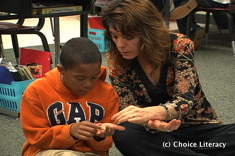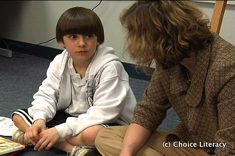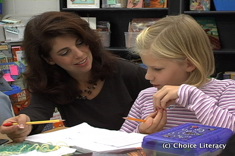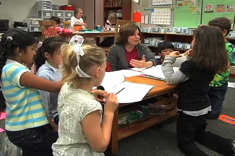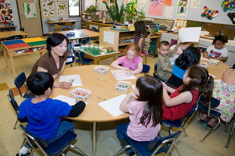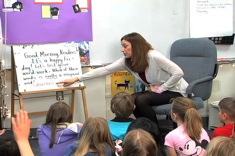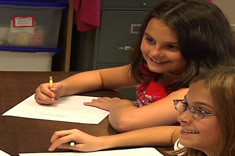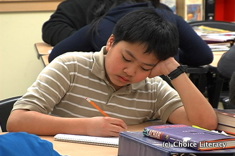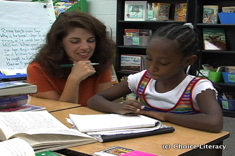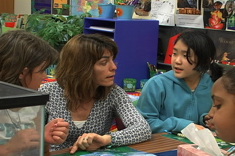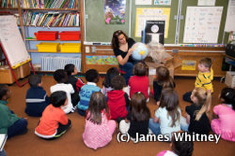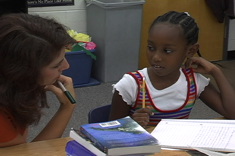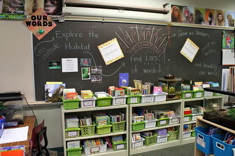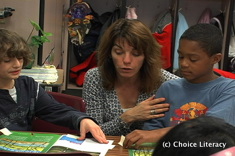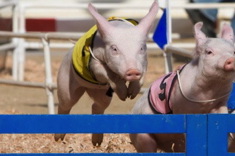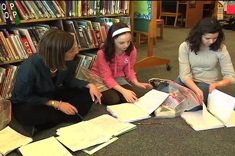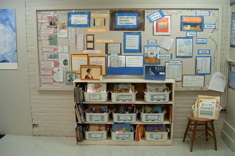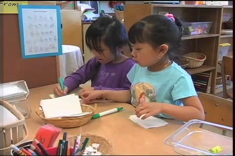Teaching Writing
Everyone who writes for Choice Literacy loves teaching writing, because we all write ourselves. We know it is "hard fun," as Donald Murray famously said—exasperating and exhilarating at the same time. The writing workshops you will read about here and see in our videos are busy, noisy, vibrant places. And most days, we wouldn't want to be anywhere else than in the midst of 'em! Here is where you'll find our latest discoveries, insights, and occasional boneheaded mistakes in teaching writing.
Latest Content
Quick Take: Selecting Mentor Texts for Writing Instruction
In this two-minute video, Aimee Buckner explains how she selects mentor texts for writing, as well as the importance of using writing by students and teachers in lessons.
The Power of Wonder Questions
Andrea Smith writes about how she uses wonder questions in her science curiculum.
Teaching Revision to Struggling Writers
Clare Landrigan and Tammy Mulligan offer three strategies to use during writing conferences with struggling students.
New Notebook Essentials
We’ve all had the experience of reading a professional book and disagreeing with some of the ideas from the author. It’s just a little more surreal when you wrote the book! Aimee Buckner participates in her school’s study group reading of Notebook Know-How, and finds some of her thinking about notebooks has changed over the past few years.
A Thanksgiving Take on Differentiating Instruction
Kathy Collins looks around the holiday table and discovers that differentiating instruction is similar to hosting a Thanksgiving feast.
When Does Level Matter? Being Efficient with Small Group Instruction
When does level matter in grouping students for reading instruction?  Franki Sibberson shares her latest thinking and a template to use in organizing groups.
Lessons from Family Writer’s Workshop
Clare Landrigan and Tammy Mulligan remind us that our own children are often our best teachers. Here they share all they learned from their children during a summer of writing together.
Punctuation Study with Third Graders
Mandy Robek finds a punctuation unit study with her third graders is a fun alternative to yet another genre study. Her essay includes booklists of children's literature and professional texts.
A Three-legged Dog and a Show About Nothing
If you've resolved this year to keep up with your own writing journal so that you can share the good, bad, and ugly of your process with students, you'll enjoy Jennifer Jones' inspirational and practical new piece.
Unlucky Lists: Raising Non-Writers and Non-Artists
These lists created by S. Rebecca Leigh are a fun way to size up the messages we send students about reading, writing, and drawing, and how these may influence lifelong literacy habits.
A Sponge is a Summary
Heather Rader shares a concrete analogy that students (and teachers) love for understanding how summaries work.
The Joy of Letter Writing: An Integrated Unit for Intermediate Students
Letter writing isn't a lost art in Mary Lee Hahn's 4th grade classroom. This unit has timeless appeal for students of all ages.
Dear Mrs. T: Moving Students from Summaries to Rich Response
Karen Terlecky shares how student letter writing about books has evolved over the years. The secret? Karen uses student letters from previous years as mentor texts for moving her 5th graders from summaries to more sophisticated responses.
Our Living Minute: Integrating Nonfiction Study into Morning Meetings
Teachers can accomplish plenty in a minute if they want to add more nonfiction to their day. Learn how from Andrea Smith.
What Goes in the Writer’s Notebook?
Aimee Buckner chats with colleagues about notebooks, and finds herself rethinking what she puts in her notebook (as well as what she requires of students).
Expedition Mondays: Launching the Week with Nonfiction
Expedition Mondays launch every week in Andrea Smith's classroom with a healthy dose of nonfiction.
Engaged by the World: Maps, Globes, Reading, and Writing with Young Children
Kelly Petrin and Ruth Shagoury connect globes and children's literature with a map theme to inspire young children to write more and include visual representations in their drafts. While the examples are from a Head Start classroom, the booklist and activities are appropriate for any K-2 students.
When Do I Launch the Writer’s Notebook?
When and how should you launch writers' notebooks in your classroom? According to Aimee Bucker, it depends on if you are a "wader" or a "diver." She shares some of the ways she has slowly and quickly moved students into their notebooks in years past.
Living Words: Integrating Word Study, Technology, and Content Literacy (Part 1)
Living Words is a quick routine from Andrea Smith that helps students see the power of rich vocabulary for describing the natural world around them.
Countdown: Keeping Children at the Center of My Plans for the New Year
Cathy Mere reminds us that the excitement of facing new students is always tempered and enriched by the lessons from last year’s students that we carry with us.
Overcoming Slumps: Principles for Student Writers
Clare Landrigan finds she is struggling as a writer and runner. Getting out of both ruts helps her develop three simple principles for working with students in slumps.
Writing Like a Scientist: Launching a Scientist’s Notebook
Andrea Smith explains how she launches a unit on science writing with logs, writing samples from scientists, and mentor texts.
A Coach’s Perspective: No More Flying Pig Prompts
Heather Rader has advice for literacy coaches dealing with teachers who rely too much on writing prompts.
The Over-Prompting of Young Writers
Heather Rader shares strategies teachers at any grade level can use to become more thoughtful and flexible in their use of prompts.
Creating a Model Writing School
Julie Johnson shares the professional development plan and experiences that led to her school's evolution into a model writing school.
Creating a Model Writing School . . . Next Steps
Julie Johnson documents the continuing evolution of her learning community as a model writing school.
Making Book Logs Purposeful for Students
Is the use of reading logs getting a little stale in your classroom? Clare Landrigan and Tammy Mulligan have suggestions for assessing and refreshing the activity.
Letters in the Middle School Classroom
First-year teacher Erin Ocon finds an old-fashioned way to build rapport with some of her struggling middle school students – she writes letters to them. This brief article would be a good reading for a middle school team meeting or new teacher group.
Rethinking a Study of Nonfiction Writing
Franki Sibberson reflects on her nonfiction writing unit, and realizes she emphasizes research skills at the expense of the craft of nonfiction writing.
Preschool Letter Detectives
Andie Cunningham works with three-, and four-year-olds as they become "letter detectives." This activity is a wonderful bridge between children's natural curiosity and the alphabet, suitable for preschoolers or kindergartners.
Browse Content By
Type
Category
- Assessment Tools
- Big Fresh Archives
- Booklists
- Choice Numeracy
- Classroom Design
- Common Core
- Community Building
- Conferring
- Content Literacy
- Digital Literacy
- English Language Learners
- Equity
- Family Relations
- Free Samples
- Guiding Groups
- Leadership
- Literacy Coaches
- Mentor Texts
- Minilessons
- New Teacher Mentors
- Podcasts
- Poetry
- Quote Collections
- Reading Strategies
- Self Care
- Struggling and Striving Learners
- Talking and Listening
- Teacher Study Groups
- Teaching Reading
- Teaching Writing
- Word Study and Vocabulary
Author
- Melissa Quimby
- Nawal Qarooni
- Gwen Blumberg
- Julie Cox
- The Lead Learners
- Hannah Tills
- Josie Stewart
- Ruth Metcalfe
- Mallory Messenger
- Becca Burk
- Jodie Bailey
- Vivian Chen
- Mary Brower
- Tiffany Abbott Fuller
- Stephanie Affinito
- Ruth Ayres
- Leigh Anne Eck
- Heather Fisher
- Shari Frost
- Julie Johnson
- Suzy Kaback
- Gigi McAllister
- Shirl McPhillips
- Melanie Meehan
- Cathy Mere
- Debbie Miller
- Tara Barnett and Kate Mills
- Tammy Mulligan
- Dana Murphy
- Bitsy Parks
- David Pittman
- Brenda Power
- Heather Rader
- Matt Renwick
- Mandy Robek
- Christy Rush-Levine
- Gretchen Schroeder
- Jen Schwanke
- Brian Sepe
- Katherine Sokolowski
- Stella Villalba
- Jennifer Vincent
Grade Level
Choice Literacy Membership
Articles
Get full access to all Choice Literacy article content
Videos
Get full access to all Choice Literacy video content
Courses
Access Choice Literacy course curriculum and training


